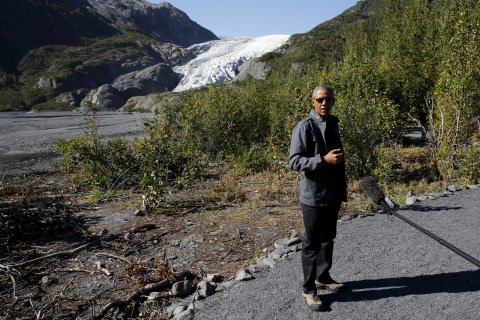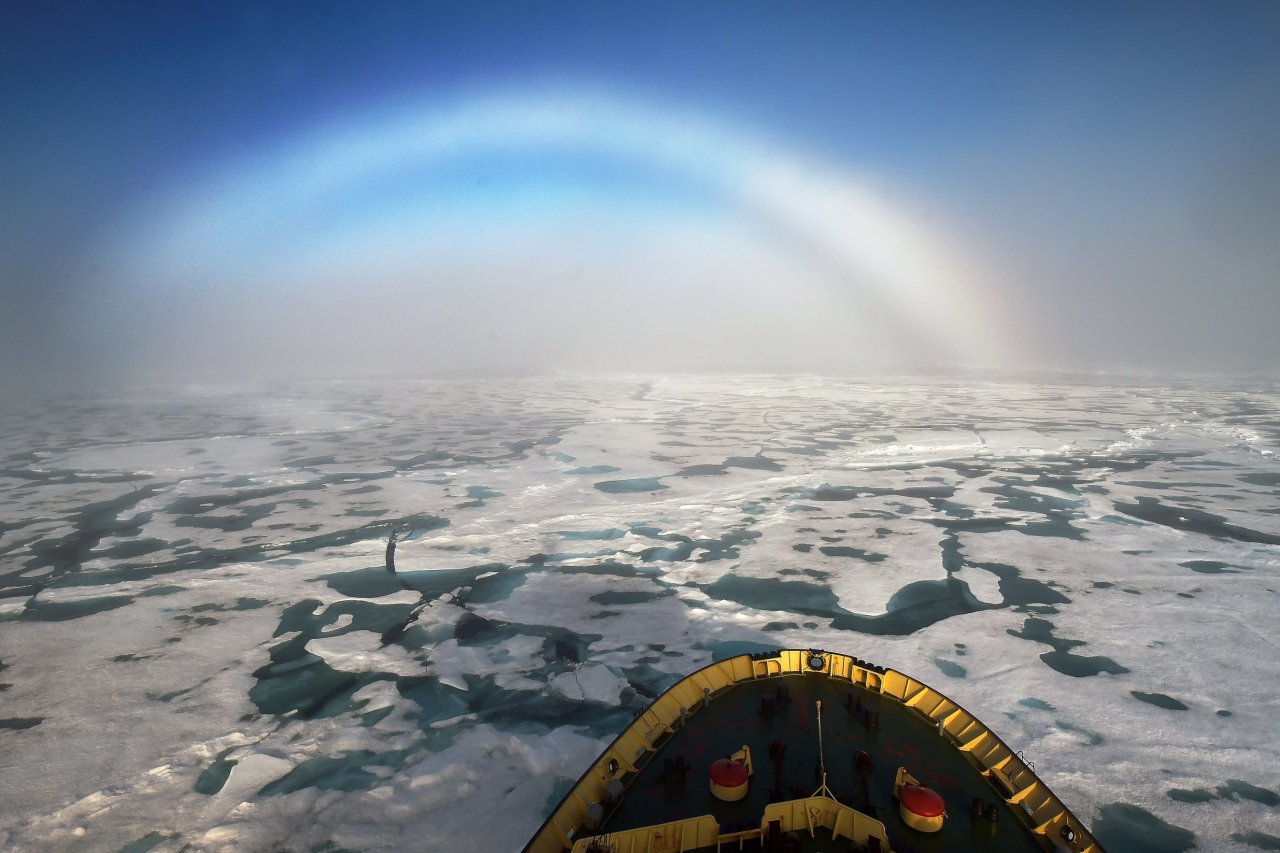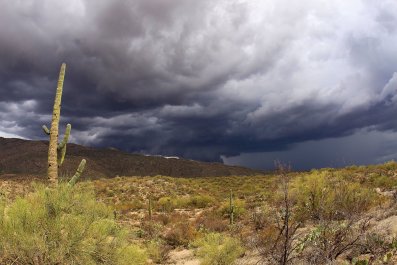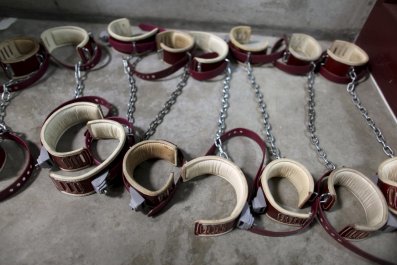You'd be forgiven for thinking a new cold war is underway in the Arctic. Judging by appearances—from presidential proclamations to front-page screamers—it seems we are deep into an arms race of naval exercises and icebreaker ships, and that any day now the winner will be announced. That country, the popular narrative suggests, will then become the oil-soaked Saudi Arabia of the frozen north, and the losers will hang their heads.
The headlines look like that because countries are acting like that: A few years ago, Russia dropped a titanium Russian flag 2.5 miles under water to symbolically stake claim to the disputed North Pole. Nations, meanwhile, are pushing to beef up their presence in the region. When President Barack Obama called for the U.S. to expand its wee fleet of two icebreakers as fast as possible while he visited the region earlier this month, it was hard not to think about Russia's formidable icebreaker fleet (it has 41, with plans for 11 more).
But all this is mostly grandstanding, according to experts. It isn't how the division of the Arctic will work, and the countries involved know it. First of all, most of the Arctic isn't even up for grabs. A declaration signed in 2008 in Ilulissat, Greenland, by the five nations with land territory bordering the Arctic Ocean—Denmark, Norway, Canada, Russia and the United States—committed the countries to dividing territory according to the U.N.'s Law of the Sea. That means each nation gets exclusive economic rights to the area where its continental shelf extends into the ocean, up to 200 nautical miles beyond its coast.
After 200 nautical miles is when it gets a little trickier. Under the Law of the Sea, a country that wishes to stake claim to any amount of seabed beyond that point would have to scientifically prove that their continental shelf extends that far. That requires rigorous scientific data used to map where each country's continental shelf ends––data that takes years to collect, since scientific ships have only a few ice-free weeks a year to work. Once gathered, the Law of the Sea mandates that data be submitted to a U.N. Oceans and Law of the Sea Commission on the Limits of the Continental Shelf, which decides whether the science behind the maps is sound.
But there's no racing here; the U.N. commission's decision process could take months or, more likely, dozens of years, thanks to a "daunting backlog" of claims the commission is facing from around the world (it handles territorial disputes on continental shelves from all over), according to Clive Schofield, the director of research at the Australian Centre for Ocean Resource and Security and an appointee to an advisory board for the U.N. Commission, who wrote a paper on the topic this year. "At the commission's current rate of progress," says Schofield, "several decades are likely to pass before final and binding outer limits to national continental-shelf claims can be fixed for all states that have submitted claims." It will be years before we know into whose hands the remaining unclaimed chunks of the Arctic will fall.
And all the Arctic countries are likely to wait it out—even Russia—because this unclaimed portion of sea floor beyond their 200 nautical-mile reach is comparatively not all that valuable. The oil and gas payoff of laying claim to the center of the Arctic Ocean is likely not much compared with what countries already control. Yes, the Arctic could contain as much as 22 percent of the world's untapped oil and natural gas reserves, but those reserves are sitting almost entirely in areas already under the jurisdiction of various Arctic countries. A U.S. Geological Survey report from 2008 found that in the part of the Arctic Ocean still up for grabs—centered on the still-unassigned North Pole—the probability of discovering a major source of hydrocarbons is less than 10 percent.
That might be why everyone is, more or less, playing nice in the Arctic. The U.S. signed the Ilulissat Declaration in 2008, along with the four other Arctic Ocean nations, but in distinctly American fashion, it never ratified the U.N.'s Law of the Sea, the basis for the Ilulissat Declaration, "because of political maneuvering in the Senate," says Betsy Baker, an associate professor of law at Vermont Law School and an expert in Arctic Ocean governance. Had the U.S. ratified it, the country would be obligated, like the other nations, to submit a scientific basis for a territory claim within 10 years; the last time the Law of the Sea was in the news, U.S. Republicans were arguing that dealing with these types of claims processes would infringe on America's national sovereignty.
Still, the U.S. is deep into the process of mapping its continental shelf, and is following the rules as though it were part of the declaration, Baker says. As a member of the science crew of the U.S. Coast Guard icebreaker Healy during its first of two Arctic Ocean mapping cruises, Baker saw proof of the cooperation between nations undertaking the "hugely expensive and complicated" task of mapping their continental shelves. Canada and the U.S., for example, "map together notwithstanding the fact that Canada has ratified the convention and the United States has not, and in spite of a longstanding disagreement over the maritime boundary in the Arctic Ocean's Beaufort Sea," she wrote in a paper in the Vermont Law Review in 2012.
Despite this, Baker says, for years the media has been conflating the situation in the Arctic with the larger geopolitical struggles of the countries involved—like the situation in Ukraine, which has soured relations between Russia and much of the rest of the world. Those conflicts don't really impact international relations in the Arctic and have no bearing on territorial claims there, Baker says. "I don't want to sound as though everything in the Arctic is happening in a vacuum, but the Arctic has been a zone of cooperation and peace since after the Cold War and continues to be. There's a lot of scientific cooperation up there."
Of course, there are exceptions. States sometimes don't like their scientists' conclusions. Canada was about to submit its Arctic claim to the U.N. commission for evaluation at the end of 2013. The data behind the claim took Canada's scientists years to develop. Then, at the last minute, "the prime minister yanked the Arctic submission, much to everyone's surprise," says Ron Macnab, a retired marine geophysicist with Geological Survey of Canada, and a past chairman of the international Advisory Board on the Scientific and Technical Aspects of the Law of the Sea.
The problem? The scientists hadn't included the North Pole in the claim, and Prime Minister Stephen Harper wasn't about to let go of the North Pole. Canada's scientists were told by the administration to "do additional and necessary work to ensure that a submission for the full extent of the continental shelf in the Arctic includes Canada's claim to the North Pole," the country's then-foreign affairs minister announced during a news conference.

Canadian experts openly disagreed with the decision. "In five or 10 or 20 years, we are going to have to admit that the North Pole is not Canadian," international law expert Michael Byers, who teaches at the University of British Columbia, told reporters. Key members of the scientific team subsequently departed, according to Macnab, which he says amounts to a brain drain that will hinder Canada's second attempt at stating its scientific case to the U.N. "This was a political decision by an individual who had no demonstrable scientific or technical expertise concerning the matter at hand. By all accounts, members of the project team (including the foreign affairs minister of the day) were stunned by this sudden rejection of their findings," wrote Macnab in scathing rebuke of the decision. The administration didn't deny allegations that the order came directly from Harper, according to the Alaska Dispatch News.
A year later, Denmark submitted its claims, which included the North Pole. While media reports painted the move as a bald-faced " challenge," in the words of the BBC, to Russia and Canada, those in the know had fully expected it, according to Macnab. Many considered the subsea Lomonosov Ridge, which is connected to the North Pole, to be part of the continental shelf of Greenland, a Danish territory. "Very early on in the game, it became very clear that the Danish wedge would include the North Pole. My own sense is that Denmark has the strongest claim," Macnab says. The U.N. assessment of Denmark's claim has been going on for nearly a year.
Meanwhile, Canada will send scientists back out to the ice to try again. Macnab says a new claim submission will take years of scientific expeditions and cost at minimum $100 million. Even then, he says, "It's a 'putting lipstick on a pig' kind of job, with no certainty that the [U.N.] commission will look at this with any credibility." Russia's first attempt at a claim to territory was rejected in 2002 on the basis of insufficient evidence, and the nation has just resubmitted its data. And even if the U.S. were to ratify the Ilulissat Declaration tomorrow, it would be 2025 before it was required to submit a claim. Norway is the only nation to have its claim approved by the U.N., but it claimed only "a sliver" of the Arctic Ocean.
In short, by the time all the claims shake out, with Arctic ice melting rapidly, the region might look like an entirely different place.
"At one point, I looked at all outstanding submissions around the world. It would take half a century before this is all said and done," Macnab says. And despite instances of government interference, as in the case of Canada, Macnab expects there to be a lot less of a battle over the Arctic Ocean than the press portrays. "The media tends to look for antagonisms. But in fact, until our prime minister pulled this, it was a very well-ordered process. The rules of the game had been decided upon. It's not a Wild West sort of competition. There's an understanding [among nations] that they are better off cooperating."



















